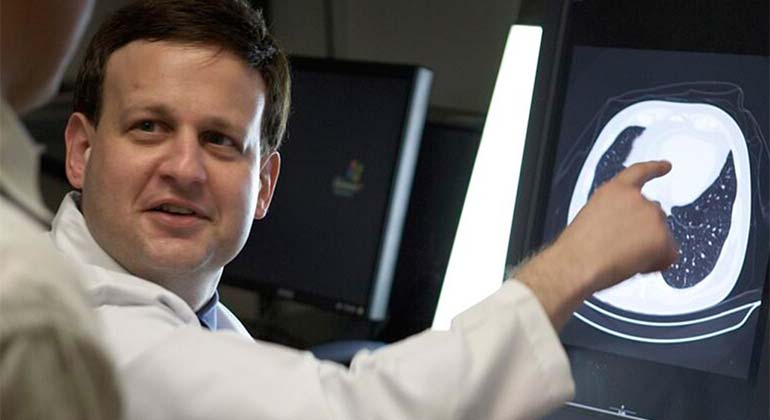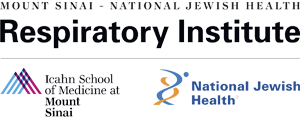
Sarcoidosis Program
Sarcoidosis is a challenging disease in which patients can struggle for years with ineffective treatments and unanswered questions. For over 70 years, Mount Sinai has been committed to developing unparalleled sarcoidosis service that combines all the medical skills and resources patients need to manage every aspect of this condition. Since 1948, our sarcoidosis program has grown to become the one of the most prolific in the world, with nearly 20,000 patients enrolled to date. And now, we have expanded to form a unique partnership: the Mount Sinai ̶ National Jewish Health Respiratory Institute.
Sarcoidosis is a multi-organ disease, and through our expanded program we offer expertise in all aspects of the condition with the help of multidisciplinary teams that include cardiologists, neurologists, pathologists, ophthalmologists, and other specialists working together to provide the most comprehensive care possible.
Types of Sarcoidosis
While sarcoidosis may affect any organ within the body, it most commonly affects the lungs. Patients may complain of coughing and/or shortness of breath and/or wheezing. Patients with sarcoidosis may exhibit an abnormal chest x-ray. Sometimes the chest x-ray shows infiltration of the lungs. Other times, the lymph nodes within the chest may be swollen. The various abnormalities are typically classified into four patterns, which have historically been referred to as stages.
It’s important to emphasize, however, that the chest x-ray is staged, but not the disease. The various stages of the chest x-ray have some prognostic significance but do not determine the severity of a patient’s disease. Patients with sarcoidosis are typically asked to undergo pulmonary function testing (a breathing test). This test tells the doctor whether the lungs are functioning properly.
Sarcoidosis may also involve the joints, skin, eyes, neurologic system, and heart. Patients with involvement of the heart (cardiac sarcoidosis) may suffer from heart failure and/or arrhythmias. In severe cases of arrhythmia, patients made require placement of a pacemaker and/or defibrillator.
Causes of Sarcoidosis
While the cause of sarcoidosis is uncertain, genetic and environmental factors are critical to the development of sarcoidosis. The immune system of the sarcoidosis patient is genetically predisposed to overreact to certain foreign substances or exposures. In encountering these exposures, the immune system forms tiny collections of immune cells, called granulomas. Granulomas form in various organ systems throughout the body. In some cases, the granulomas are harmless inhabitants of these organs. In other cases, the granulomas elicit inflammation, which compromises the normal function of the inhabited organ.
Symptoms of Sarcoidosis
For reasons that are poorly understood, certain granulomas cause inflammation. Inflammation within the lung may cause coughing, shortness of breath or wheezing, while inflammation in the heart may cause heart failure or arrhythmias. Inflammation in the skin may causes nodules, bumps or rashes. Inflammation in the eyes may cause pain, redness, light sensitivity, blurred vision and, in severe cases, blindness.
Sarcoidosis may also cause nonspecific symptoms of fever, malaise, weight loss, fatigue, and night sweats. Although the majority of sarcoidosis patients have no symptoms, in those who exhibit symptoms, sarcoidosis is a very treatable disease that responds well to anti-inflammatory therapies.
Treatments for Sarcoidosis
Since the exact cause of sarcoidosis is unknown, the disease cannot be cured. In more severe cases, patients are given anti-inflammatory medications to suppress the inflammation produced by granulomas. In most cases, these medications improve organ function as well as patients’ symptoms. The majority of patients with sarcoidosis respond to treatment and experience a reasonably good quality of life.
Healthy Living
In addition to regular check-ups with your doctor, it’s incredibly important to keep your sarcoidosis in check by eating a well-balanced diet and drinking the recommended amount of water. Sleep is also imperative to maintaining your health as well as exercise. If you are currently a smoker, you should create a plan for quitting immediately.
Medications
The majority of patients with sarcoidosis do not require treatment. In more severe cases, treatment consists of anti-inflammatory medications, which suppress the inflammation associated with granulomas. Prednisone, a corticosteroid, is the mainstay of therapy for sarcoidosis. Prednisone is effective in approximately 90% of patients. It cannot, however, be used in high doses, on a long-term basis because it may cause debilitating side effects. Other anti-inflammatory medications include:
- Azathioprine
- Hydrochloroquine
- Infliximab
- Methotrexate
- Mycophenolate
Sarcoidosis Support Group
Our Sarcoidosis Program is pleased to offer patients and their loved ones additional care and guidance through our active support group. Regular meetings allow patients to ask questions, learn about new diagnoses and therapies, and meet the members of our multidisciplinary staff who participate in their care.
Through our Support Group, advanced diagnostics, research, treatments, and the expertise of our multidisciplinary team, the Sarcoidosis Program strives to give patients the answers, therapies, and tools they need to manage this disease as successfully as possible.
Why Choose Mount Sinai – National Jewish Health Respiratory Institute
Because our Sarcoidosis Program sees a uniquely high volume of patients with the most complex cases, the Mount Sinai ̶ National Jewish Health Respiratory Institute has developed a rare level of experience and skill in diagnosing and treating the most challenging forms of this disease.
The care we provide is enhanced by our affiliation with the NIH Center of Excellence for research in sarcoidosis. Through research and clinical trials, our Program is investigating new treatments for sarcoidosis. We are also exploring the biology of the disease in order to advance our understanding of how the condition develops.
We are the only medical center in the United States offering the Kveim-Siltzbach skin test, a noninvasive diagnostic test for sarcoidosis that our specialists are skilled in administering and interpreting. Our physicians are also experienced in administering immunomodulatory medication therapies (alternatives to prednisone) as well as evaluating patients for more invasive treatments, such as organ transplantation.
As a patient, you can be assured that you’ll have access to the latest treatments and leading experts from every discipline. Feel confident that you have an exceptional team, committed to your care.
